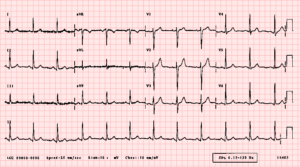This is how the AI article summary could look. Lorem ipsum dolor sit amet, consectetur adipiscing elit, sed do eiusmod tempor incididunt ut labore et dolore magna aliqua. Ut enim ad minim veniam, quis nostrud exercitation ullamco laboris nisi ut aliquip ex ea commodo consequat.
What is an ECG – and what are they done?

A normal ECG.
An ECG (electrocardiogram) is a test that records the electrical activity of your heart; including the rate, rhythm and direction of electrical impulses. It’s quick and painless, and carries no risk.
Why is it done?
You will usually have an ECG (electrocardiogram) if a doctor (or health professional) thinks you are having symptoms of:
- Heart attack (myocardial infarction, MI)
- Angina – this is a cramp of the heart muscle that can a warning sign of a heart attack
- Arrthythmia – problems with how quickly or regularly your heart beats (arrhythmia) – e.g. atrial fibrillation (AF)
- Heart failure – looking for the cause
- Pericarditis – a heart inflammation.
You also may have an ECG
- Before an operation – to check you are well enough to have it
- Before and whilst taking certain medicines.
Preparing for an ECG (electrocardiogram)
There are some things you can do to help you prepare for an ECG (electrocardiogram), such as:
- Wearing a top that is easy to take on and off
- Not putting body lotions etc on your skin before the test
- Not eating a heavy meal or having caffeine before an exercise ECG (stress test)
Some men may also need to have their chest partly shaved and cleaned before the test.
